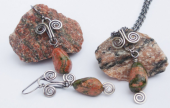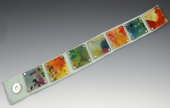More Classes by this Instructor
-
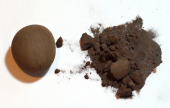 Free!In this free class Sophie Turlur-Chabanon will demonstrate how to mix metal powder with de ...
Free!In this free class Sophie Turlur-Chabanon will demonstrate how to mix metal powder with de ... -
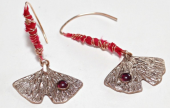 $23In this class Sophie Turlur-Chabanon will teach you how to make a pair of earrings in text ...
$23In this class Sophie Turlur-Chabanon will teach you how to make a pair of earrings in text ... -
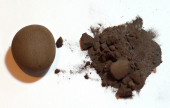 Free!Dans cette classe gratuite CraftArtEdu, Sophie Turlur-Chabanon vous montre comment conditi ...
Free!Dans cette classe gratuite CraftArtEdu, Sophie Turlur-Chabanon vous montre comment conditi ...
Other What's New Classes
Learn More About this Class
- ... materials
-
Liste du matériel :
Matériel pour réaliser la feuille de ginkgo
• gabarit de découpe de feuilles de ginkgo OU feuille plastique transparente + feuille de papier + marqueur + crayon papier + ciseau
• 15 à 20 g de pâte de bronze doré prête à l'emploi (Meteor clay ou Prometheus)
• pot hermétique de barbotine de bronze doré (argile délayée)
• film alimentaire étirable type cellophane
• rouleau acrylique
• 2 surfaces de travail anti adhérentes
• réglettes cadres de différentes épaisseurs OU réglettes rectangulaires de différentes épaisseurs OU cartes à jouer coupées dans la longueur
• huile d'olive
• eau déminéralisée
• spatule
• cure dents
• pinceau
• cutter
• tampon avec signature (optionnel)
• 2 pierres de laboratoire supportant une cuisson à plus de 800°C (corundum rond lisse de 5 mm)
• pince brucelle
• petit carrelage
• morceau de tissu polaireMatériel pour le poncage et la cuisson :
• éponges abrasives 3M : rouge (fine / superfine), bleu (ultrafine) et vert (microfine)
• lime plate
• pinceau sec
• feuille de papier
• pot hermétique pour récupérer la poudre poncée
• plaque grille protège feu
• four ménager avec position grill
• conteneur inox
• four hautes températures type Prometheus ou Paragon ou Météor M40 cloud
• charbon actif de coco
• bloc de gomme pour poser la pièce lors des finitions (optionnel)
• brosse acier
• brunissoir pointe agate
• papier carrosserie à poncer de grain 400, 600, 800, 1000, 1200, 1500 (optionnel)Matériel pour l'attache :
• marqueur
• règle
• fil de bronze 0.9 mm
• fil de bronze 0.5 mm
• pince coupante
• pince plate
• pince ronde (optionnel)
• lime
• ruban de 6 cm de longueur
• ciseau
• flacon en verre
• marteau à tête plate (optionnel)
• bloc à taper (optionnel)
• isolant à bijoux (optionnel)
- ... instructors
-

Sophie Turlur-Chabanon
Since her childhood, creating has always been a second nature for Sophie. She was initiated to multi-faceted techniques such as drawing, engraving, enameling, and mosaics.
In 2005, she handcrafted her first jewelry pieces by combining multi-colored beads and seeds. One year later, she discovered polymer clay which allowed her to make her own shapes, colors and imitations. In 2010, the discovery of metal clay was a real revelation. All her previous work and learned techniques in polymer clay were really useful to switch from one media to the other. In 2011, Sophie was certified in Senior Art Clay. ...
Read more - ... FAQ
-
Frequently Asked Questions
If you cannot find the answer you are looking for in your FAQ, please contact us on [email protected]
I am having problems viewing the classes. Any suggestions?
The classes should play fine across all common browsers and operating systems. The only technical requirement is a fairly recent version of the Adobe Flash Player. You can download the latest player for free at http://get.adobe.com/flashplayer/ . For best possible viewing experience, we recommend above average Internet connections.
If you are experiencing problems such as delays, chopping, freezing or browser crashing, please make sure that you have the latest flash version and are on a stable and fairly good connection. It will also very often help to empty your browser cache.
If you are on a recent flash version, with a good connection, have emptied your cache and still have problems viewing the class, please contact us!
For how long can I access my courses?
Forever. Your access to your CraftArtEdu classes never expires. You can watch them anytime and as many times you would like.
How do I access the class after purchasing it?
Your class is available to view from your account under “My Account."
I am having problems accessing the class handout.
The class handouts are PDF's If there is an instructor hand out for your class, it will be in your account on the View Class page link under Material Links.
After taking a class, are you then allowed to use the technique to produce pieces to sell, as long as you reference that it was a technique learned from whoever taught the class?
"Yes, students can produce work to sell - teachers know that they are putting techniques out there for their students to use. The hope is that the student will apply techniques to create their own unique spin on them, but we cannot take money from students and then say "you can't do that." We do ask that they give credit to the originator." - Donna Kato
Can I become a CraftArtEdu Instuctor?
We are always looking for great instructors. If you are interested in teaching, please send us an email: [email protected] with a description of the media you would like to teach as well as your bio and a link to your website.
- ... reviews

